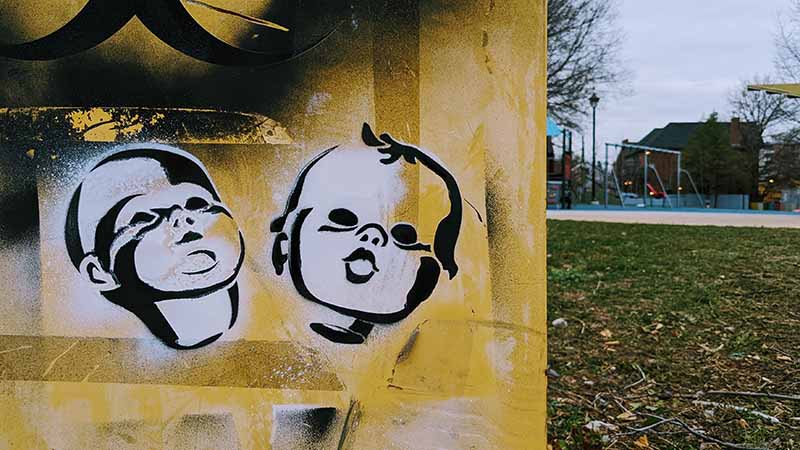In the early autumn, Cristina and Nicole engaged with Dr. Adam Davies to think together about the work of crafting life and joy-sustaining pedagogies in the context of the province of Ontario – a context ripe with child development, heteronormativity, and everyday invocations of human difference as deficit. Dr. Adam Davies (they, them, theirs) is an Assistant Professor of Family Relations and Human Development at the University of Guelph. They are the Co-Chair of the Anti-Oppression Rainbow Research Lab and are active on Twitter where they boldly advocate for the rights of students and professors amid the neoliberal institution. As Cristina and Nicole prepared to offer Adam an opening provocation for our dialogue, we turned to Adam’s recent publications which invoke a palpable sense of living and embodying pedagogy as it functions as a world-making process, and never resting with pedagogy as a technocratic practice. From here, our conversation moved toward thinking who we see as our co-conspirators in this work of thinking pedagogically and in proposing possible educational worlds that are infused in ethical desire, where Adam emphasized the labour of critique in dismantling child development and the normativity it produces and reproduces, and brought to our attention a certain ethos of critique as life-giving, joining a history of thinking critique as more than neoliberalism’s ‘critical thinking’. Bringing our conversation to a (we hope temporary) close, we ask Adam about their work of critique and this insistence on refusal, where insistence is a doubled move that also insists on life. Together, many threads of the work of a pedagogist weave through our conversation, from thinking embodiment, commons, critique, collectivity, and futurity, to mounting tangible gestures against technocracy, essentialism, child development, and the colonial heteropatriarchy. We are so grateful to Adam for their time, and we offer this conversation as the inauguration of a new ally relationship and thinking companion for our work in the Pedagogist Network of Ontario. Thank you, Adam.
Cristina and Nicole: As we prepared for this conversation, we turned to some of your more recent work and, through your writing, we feel a strong impulse toward refusing to allow normative, status quo practices to stand – and, concurrently, the desire to find hopeful, affirming, life-making relations forward with children and educators. In particular, in your work on sanism with Kailyn Brewer and Bronte Shay (2022), you write “the Mad Educator resists the normalizing gaze of developmentalism and neoliberal ideas of accountability and assessment to step into the unknown” (p. 27). We, in the PNO, relate to this step, this move, into the uncertainty of not relying upon an already existing commons. There’s a vein of refusal-fuelled reinvention here; the notion that pedagogy is not work we already know. With the PNO, we find ourselves often returning to pedagogy as the labour of actively following the transformations and inventions of thinking with this “step”, this unknown that isn’t untethered from reality but is grounded in our pedagogical intentions to create otherwise worlds with children and educators. Further, in your essay on heterprofessionalism (with Ruth Neustifer, 2021), you show how “our narratives express dissidence to the neoliberal status quo of higher education and signify how bringing queer and trans identities, embodiments, and theories into classrooms can challenge pretenses of neutrality and objectivity in higher education as well as dominant frameworks employed” (p. 18). This emphasis on pedagogy as a bodied experience, as not simply an abstract theoretical provocation echoes the “step” above and is of great interest to us – how do pedagogists embody their work? We sense a boldness here, a proposition that we need to enliven our pedagogical commitments through more than simply work in the abstract and instead live this as deeply bodied, fleshed work. Pulling these pieces together, we would like to ask a rather broad question to begin this interview: what kind of interruptions do you think pedagogical thought needs to offer to early childhood education, considering the conditions of our times?
Adam: Such great and evocative questions that leave me with much to reflect on. Thank you for this gift. I firstly begin by reflecting on the deeply bodied experience of pedagogy, as you mention, because it is through our bodies that we can reimagine our work. Pedagogical work is deeply embodied – we carry our life histories, narratives, and experiences as we do our work of teaching and learning and yet, so often we do not take notice of our bodies – or stop and consider our movements – as we engage with our day-to-day routines and lives. I use the word ‘work’ here to both indicated the material labour involved in pedagogy and acts of care and relationality, and also the labour involved in working and caring for and with children and families, and how unacknowledged that labour is in terms of psychic, emotional, psychological, and embodied investments. For queer and trans educators, our bodies are sites of re-creation, violence, trauma, and story us as we create stories within our pedagogies. For example, while working with young children, I’d often get questions about my gender based on how I carried myself throughout the room. Children would approach me and ask if I was a boy or a girl, why I was dancing around and spinning, but they would also then ask for permission if they could do such things. Our bodies are both sites of surveillance and deeply pedagogical in nature, which also offers opportunities for disruption and reinvigoration. To return to your question about how pedagogists embody their work – thinking in alignment with disrupting the hegemony of developmentalism – our bodies are sites of inquiry, deeply autobiographical, and the stories they tell are simultaneously read onto us. To bring our stories into our pedagogies can be a dangerous act for those who are invested in prescriptive and stages and ages constructions of children and educators that are based in ideas of application and technocracy.
When bodies do not conform to heteronormative and cisnormative expectations – especially practitioners – such bodies become open to punishment, or attempts to question and challenge self-expression, such as children asking why a male-presenting educator is dancing and singing around the classroom, or wearing a dress. However, this work is deeply political as it opens new opportunities for children to imagine ways of living outside of the constraints of normativity. Within these times, as scholars such as Maria Karmiris have written in the context of returns to “normal” in education, normalcy is one of the greatest dangers and reinforcers of oppression that goes unnoticed. If pedagogical thought (and action, as the thinking and doing are always intertwined) can interrupt normalcy, this should be considered in all facets of our work. However, if the epistemological foundations of the work we do is still entrenched in ideas of containment and normalcy, we will not be able to take such “steps into the unknown” (drawing from Brenda LeFrançois’ work). As I’ve written about in my own work, I think part of pedagogy is bringing in our autobiographies (I’m thinking here with curriculum studies scholar, William Pinar). If pedagogy is lived and fleshy, as you mention, our bodies and the stories our bodies carry are pedagogical in the stories they express and the new potentialities imagined through our embodiments in our everyday work.
Cristina and Nicole: We feel so boldly in your response a push toward acknowledging the embodied contours of pedagogy, to learning to listen to the ways that pedagogy and its concerns live in our body. This makes us think so much of a question we often grapple with in our own work: who do we think in the company of, and how? The theme of this issue of the PNO Magazine is “returning”, and we wonder about who our collaborators are – and perhaps more importantly, how we think with them – in this world-making process of not returning to an unlivable past while re-turning, re-orienting, to some sort of collective life that we might envision with pedagogy. So our question to you is this: if we want to re-turn toward creating more livable worlds and childhoods beyond essentialist caverns of normativity and the pervasive governance of child development, whom might we think with and how? Both scholarly and otherwise, embodied and public, who are our companions in this work? And how do we engage these co-conspirators?
Adam: Thank you both for this invitation — I also feel enthusiastic about getting the opportunity to have this exchange with such brilliant folx. I think that this current moment of the Anthropocene and late capitalism demands us rethink what we are in relation with in our thinking and not just considering pedagogy as embodied but also our thinking and scholarship as embodied. It is a necessity to move away from the ideas, theories, and concepts that are truly harmful to hold onto, which reminds me of Berlant’s beautiful theorization of “cruel optimism.” Asking who we think in the company of and how asks scholars and educators to incorporate their lived, corporeal and embodied experiences and memories as pedagogical beginning places. Not that I am defining what a beginning entails, but more that educators’ experiences are not merely cognitive or psychological, but also embodied. I have written about this – drawing from different theories of affect – in relationship to how moments of discomfort, disruption, or embodied reactions can also elicit new places for thinking differently and self-reflection.
Considering that developmentalism and its continued dominance in ECEC positions queer and trans children and educators as already abject, it is necessary to note how acts of world making and moving beyond essentialism necessitate trusting our embodied experiences as pedagogical., particularly for those of us who have been abjected and othered by dominant and hegemonic frameworks. Heteronormativity and cisnormativity ask that certain relations be established in ECEC as the most important ones, which usually reinforce gendered regulation, the hierarchies put in place by the nuclear family, and regulatory norms that are associated with traditional tropes of parenting. I wonder in terms of moving beyond child development and potential companions and co-conspirators, how can we imagine our relations with the more-than-human, the environment, matter, and the non-human as important? If we decenter ideas of ‘typical development’ and the associated heteronormative and cisnormative trajectories that are connected to child development, there are new potentialities for thinking of being in relation with other humans, non-humans, more-than-humans, in ways that both critique and also create new potentialities.
Here, I am purposefully not erasing the role of critique because I feel that if we are going to create a more livable world and childhoods, we have to be willing and able to critique dominant power systems and hierarchies. However, the goal of ECEC post-secondary education can be to re-imagine itself away from utilitarian and technocratic models towards allowing embodied experiences, memories, and moments to be curiosities that provide students and educators with opportunities to re-imagine their present and create new futurities. For me, in terms of conspirators, it is often my students who are my conspirators, who give me hope, who allow me to consider that ECEC can be different and that we can create new relationalities. However, the lure of neoliberalism within ECEC tries to bring us towards normality, towards what we think we know — it makes positivism appealing in a sneaky fashion. But through establishing community with my students, creating space for them to question, and acknowledging that education can be different, we begin to create new worlds.
I think that the question of collaborators and conspirators brings me to think in general about who and what I wish to be in relation with. I am inspired by theories that focus on negativity and refusal, even though I do wish to imagine a more hopeful future. By activing refusing what we do not wish to be in relation with (or who), we have the opportunity to nurture the relations and theories that we do want to be in relationship with. I am not sure what the exact answer to this is and would not want to articulate a universal idea of who and what should be conspirators but I know that by rejecting developmentalist theories and by actively seeking others in ECEC (and trusting my own misgivings with developmentalism that I have gained through my encounters with it), I have gained networks that sustain me and give me hope for futures outside of ages and stages notions.
Cristina and Nicole: We really appreciate the connection that you make between active critique and conspiration towards a future that might actually bring futurity. It seems to us that enveloped in your words is also the invitation to see ourselves not only as passive spectators of a world in constant change, as neoliberalism would like us to think, but to attend to how us—the ones in universities—might actively perform a kind of militancy that is characterized by the search for other genres of being, doing, acting, feeling. What kind of sensitivities, curiosities and wonderings do you think we need to engage with in early childhood education so that such militancy – such intent refusal in the name of re-creating – will materially and discursively happen without the risk to fall in the rhetoric of change or transformation?
Adam: What a great question. I would not want to “prescribe” any kind of specific curiosities and wonderings since I think part of the joy of both critique and re-thinking is when curiosity is produced in an unintentional way. I am left thinking about conversations of “intentionality” in early childhood education and care. I remember being in a meeting where myself and other educators were discussing intentionality and the conversation turned towards the importance of intentionality for many folks in their planning, social justice work, and ideas of transformative change. While I appreciate how this might be helpful for many as an approach to pedagogy, I find that intentionality can sometimes bring about ideas of human agency and directionality that miss out on the randomness and spur-of-the-moment nature of life. This isn’t to suggest that we shouldn’t aim for emancipation in our pedagogies, but more that we have to acknowledge how even the “unintentional” happens when we might have intentions.
This is where I think in terms of curiosities, refusing and the extent by which we can refuse the status quo is really of interest to me. Early childhood pedagogy is filled with ideas of “positive affect,” particularly joy, care, love, etc., which while important, often pathologize “negative emotions,” which can be especially useful in resisting the status quo. Educators who are deemed “negative” or “bad role models” are questioned, pushed out, deemed unable to cope or manage, etc. This isn’t advocating for unsafe educational environments, but more wondering how these processes of valorizing positive affect and emotions forward exclusion. I’m invested in mad studies research, which critiques the psychiatrization and pathologization of certain behaviours, ways of being, thinking, feeling, etc. So, in this search for other genres of being, doing, acting, feeling, is there space for educators who might not abide by these normative codes of positivity? Refusal – as a state of negativity – acknowledges that critique and new futurities are needed while also emphasizing that we are always imbricated within these structures and systems. For example, while I teach students to critique the normative status quo in my classes, I am still working within the neoliberal capitalist higher education industrial complex and receive a pay cheque from it. How much I can refuse is also dictated by my participation within the system.
This does not mean we do not continue doing the work of investing in new futurities while critiquing the status quo. However, we do so thoughtfully while acknowledging all the ways in which we continue to perpetuate violences. Perhaps this is where intentionality can be reclaimed in a reflexive manner — a type of intentionality that imagines a new future, critiques the present, while leaving the self open for change and randomness.
Thank you for the pleasure and joy of engaging in this back-and-forth with me.




